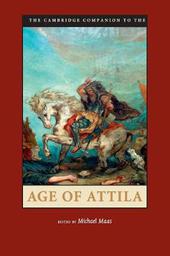
|
The Cambridge Companion to the Age of Attila
Paperback / softback
Main Details
| Title |
The Cambridge Companion to the Age of Attila
|
| Authors and Contributors |
Edited by Michael Maas
|
| Series | Cambridge Companions to the Ancient World |
|---|
| Physical Properties |
| Format:Paperback / softback | | Pages:528 | | Dimensions(mm): Height 226,Width 152 |
|
| ISBN/Barcode |
9781107633889
|
| Classifications | Dewey:936.03092 |
|---|
| Audience | | Professional & Vocational | | Tertiary Education (US: College) | |
|---|
| Illustrations |
2 Tables, unspecified; 8 Maps; 1 Halftones, unspecified; 8 Line drawings, unspecified
|
|
Publishing Details |
| Publisher |
Cambridge University Press
|
| Imprint |
Cambridge University Press
|
| Publication Date |
29 September 2014 |
| Publication Country |
United Kingdom
|
Description
This book examines the age of Attila, roughly the fifth century CE, an era in which western Eurasia experienced significant geopolitical and cultural changes. The Roman Empire collapsed in western Europe, replaced by new 'barbarian' kingdoms, but it continued in Christian Byzantine guise in the eastern Mediterranean. New states and peoples changed the face of northern Europe, while in Iran, the Sasanian Empire developed new theories of power and government. At the same time, the great Eurasian steppe became a permanent presence in the European world. This book treats Attila, the notorious king of the Huns, as both an agent of change and a symbol of the wreck of the old world order.
Author Biography
Michael Maas is Professor of History and Classical Studies at Rice University, Houston. The focus of his research is late antiquity. His publications include The Cambridge Companion to the Age of Justinian (Cambridge, 2005), Exegesis and Empire in the Early Byzantine Mediterranean (by Mohr Siebeck, translated by Michael Maas, 2003) and Readings in Late Antiquity: A Sourcebook, 2nd Edition (2010).
Reviews'This work is transformational. Although focused on the Roman Empire, it also encompasses Eurasia, including the geopolitical dilemmas of Iran. Systematic treatment of subjects ranging from law and learning to climate change and mass migration serves to calibrate the Huns' impact and identifies a shift in the stance of classical civilizations toward steppe peoples, from aloofness to fertile interaction.' Jonathan Shepard, University of Oxford 'The 'long fifth century' comes to life on a global scale as the internal workings of Roman government and society are treated within the context of larger geopolitical shifts, for which Attila - leader of the Asian steppe nomads who threatened the very existence of the Roman Empire, while at the same time aspiring to appropriate its ways - stands as a cipher.' Claudia Rapp, University of Vienna 'This excellent volume brings together a group of expert scholars who present a detailed and penetrating account of key developments in the history of the fifth-century Roman world. Michael Maas is to be warmly congratulated on putting this helpful collection together. It will surely become a standard companion for all scholars and interested general readers who want to learn more about this crucial period in the history of the Roman world and its neighbors.' John Haldon, Princeton University, New Jersey
|